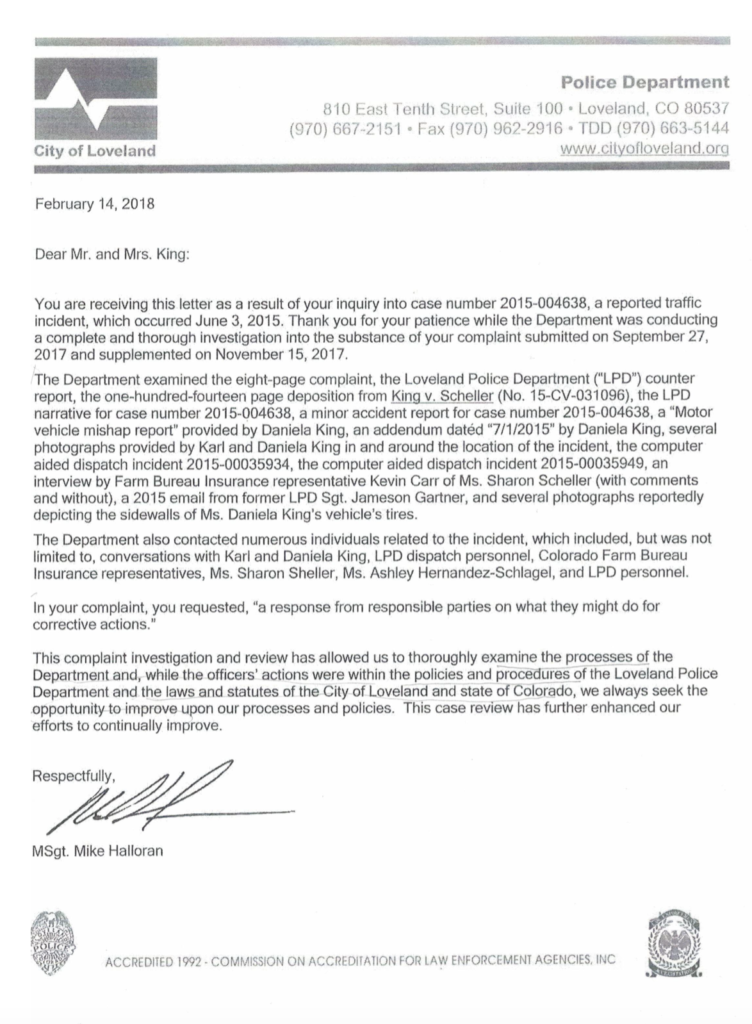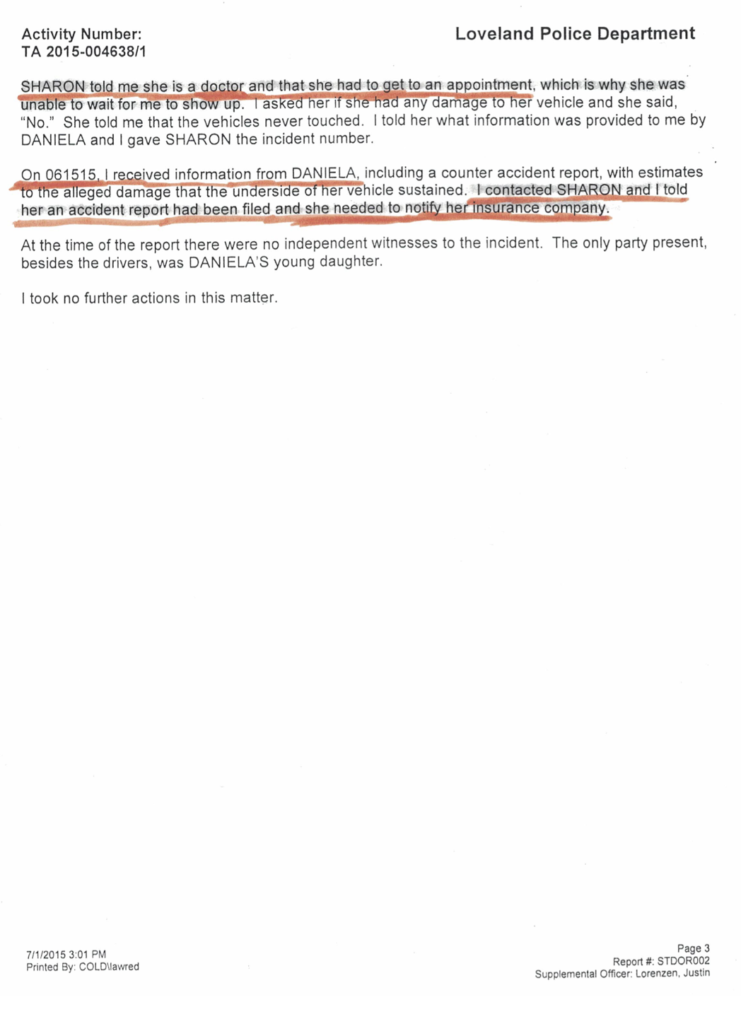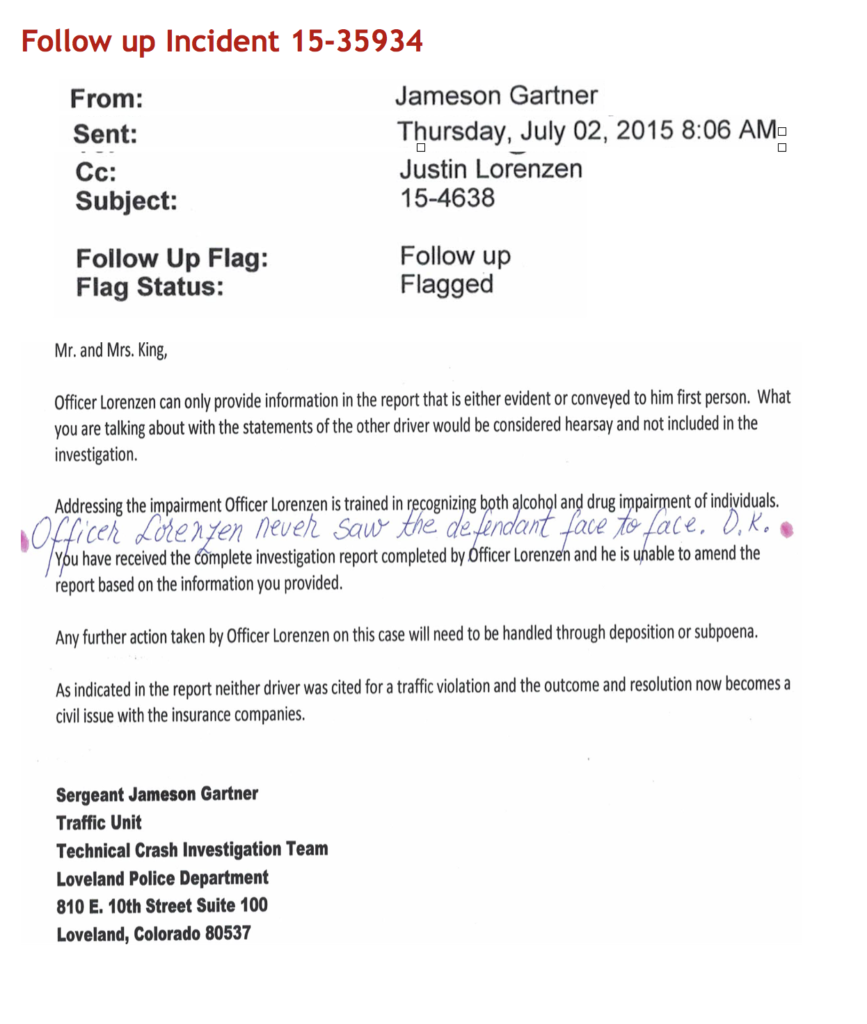Letter to Chief of Loveland Police, City Council
Sep 2017 Letter to Loveland, CO. Chief of Police Robert L. Tice, Mayor Cecil Gutierrez and the members of the Loveland City Council
September 27, 2017
To:
Chief of Police Robert L. Ticer,
Loveland City Council
MAYOR Cecil Gutierrez
WARD I
Troy Krenning
Richard Ball
WARD II
Joan Shaffer
Leah Johnson
WARD III
John H. Fogle Mayor Pro Tem
Steven D. Olson
WARD IV
Dave Clark
Don Overcash
This letter has been sent to the Loveland Chief of Police, and the members of the Loveland City Council because of a quality issue, dereliction of duty, brought to light by the performance of a particular Loveland Police Officer. We send this letter for the purpose of addressing the quality issue so that others in the community can get the services we need, and that Loveland can get the police officer performance for which their taxes pay.
Background
On June 3, 2015, Officer Justen Lorenzen was dispatched to the scene of an accident on Skypond Drive, at the Centerra mall involving my wife, Daniela King, and another lady, Sharon Scheller. Two vehicles (my wife’s van and Ms. Scheller’s Jeep) almost collided when Ms. Scheller changed lanes rapidly and without looking. My wife and minor daughter were forced off the road to avoid the collision when the Jeep changed lanes, resulting in $2,500 damage to the undercarriage of our van, and with psychological damage to my wife who later was diagnosed with anxiety, PTSD and panic attacks because of the accident. She underwent extensive counseling as a result of being run off the road in this accident.
This incident resulted in a court case, and Officer Lorenzen gave a deposition that was played in court. Because of his dereliction and failure to take appropriate steps, the facts of the case were either not presented or were misrepresented by the Officer. There were also signs of the officer’s personal bias in the presentation, as he made comments that my wife, a European national and now an American citizen, was a “foreigner” with an accent. He also made comments about our then 12-year-old daughter in his deposition and said that he would not even ask her what she observed during this event because she asked a couple of bystanders, “What are you looking at?”
The deposition given by the Officer was long and contained substantial material. The entire deposition as noted by a court reporter is in on a USB stick for you. A digital recording of the deposition is also on the stick. It can be played with Windows Media Player. What is presented below is an analysis of particular details from the deposition text (condensed version of the deposition given on 5/16/2071 by Officer Lorenzen for the case King vs. Scheller, Larimer County District Court Case No. 2015CV31096, also on the USB stick ).
The main points that we note are:
- The officer’s training
- His lack of effort
- His failure to question a witness to the accident, and assumptions
- His lack of professional judgement
- His bias
Examples of questionable performance
There are 25 examples from the deposition cited; this is a substantial list of questionable performance that deserves the reader’s attention. Rather than copy each section of the deposition, we have excerpted items. The full text is attached in digital form should the reader want to see the context.
After each excerpt, a comment follows the initials KK.
Training ( 1 item )
The first 15 pages of the depo list the officer’s substantial training and experience on the way to becoming a Level IV accident reconstructionist, and CDR analyst.
KK: Presumably, this significant training was paid for by the citizens of Loveland. As will be shown below, much of this training went unused in this case.
Lack of effort ( 14 items )
Page 5/19: No report was done on the incident because Officer Lorenzen didn’t consider it an accident. Only an incident number was given.
KK: Facts show that there was physical damage to one of the cars, and psychological damage done to the driver of the van. This is just the beginning of numerous failures to take the incident seriously and put forth the effort to do a professional job.
Page 23/24: He repeatedly mentions the site of the discussions as being at “Kay Jewlers, which is just inside the mall area.”
KK: This is erroneous. Kay Jewelers is far away, at the center of the mall. This shows a lack of observation of relevant details. That shows up in other areas of work as well.
Page 24: regarding a creek or ravine at the site of the accident, he says “There could be one.”
KK: Again, a serious lack of attention. He clearly did not look around the site to see what was there.
Page 24: Q. But nothing right at that intersection area that would really draw your attention? A. “Not that I can recall, no.” See photos 1 and 2 of the waterway. This clearly shows that the officer did not seriously consider the area.

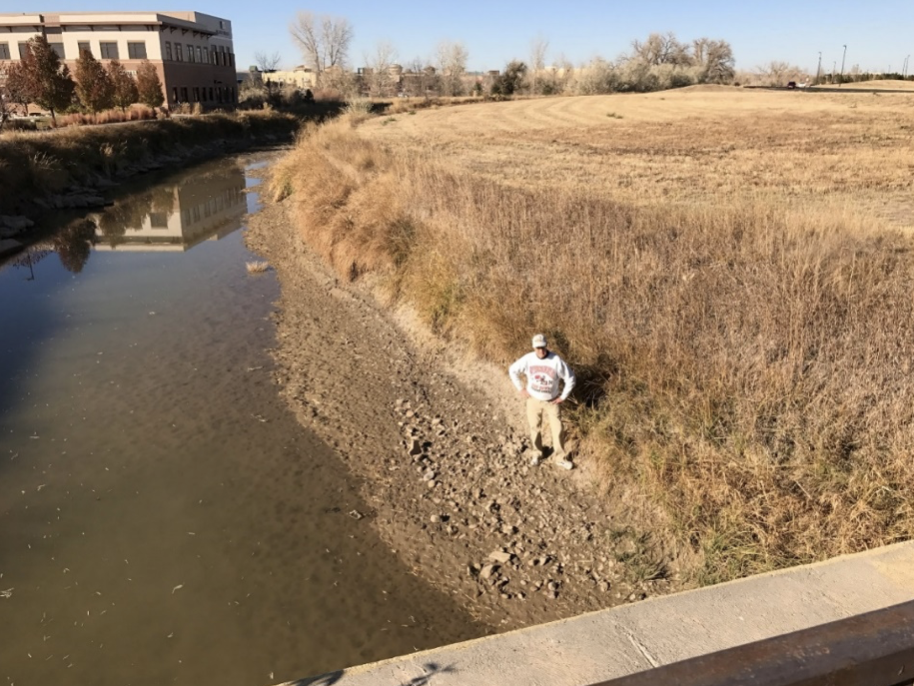
Page 30/31: The perpetrator leaves the parking lot after being specifically told by Mrs. King that police were on the way and that she should stay. The officer seems uninterested in the fact and does not pursue the perpetrator.
KK: The Ms. Scheller ( the inattentive driver ) had gone to Biaggi’s restaurant adjacent the parking lot. Mrs. King and her daughter had just spoken with her face to face, and saw how she was dressed. The officer could easily have gone to Biaggi’s with the Kings to find Scheller. The officer’s failure to take this step means that with all his training, he couldn’t assess Scheller’s physical status nor could he test for impairment such as drunkenness.
Pag37: Q. So you couldn’t find any evidence that she ( King’s van ) had gone up onto the curb or onto the – off of the roadway? A. No. But I didn’t have an exact point of where they’d hit either, allegedly.
KK: With all his special training on accident reconstruction, the officer did absolutely nothing to understand what had happened. The Kings visited the site and found that distance from where the van left the road to the place where it stopped next to the waterway was 77 feet. At 30mph, the time to travel that far was under 2 seconds. The time from the turn to where the van left the roadway was not more than 1 second, implying that the near-collision happened fast, leaving little time for Daniela King to react to the rapidly approaching Jeep. This shows a continual failure of the officer to do job for which he was amply trained. Personal note: Mr. King has worked for 50 years as an engineer and applied mathematician, so the reconstruction math is easy for him.
Page 40-43: The officer explains that he saw no damage while inspecting the King’s van.
KK: Insurance adjusters looking at the van saw a number of points of damage in just a quick walk-around. Again, the officer failed to observe what others saw easily. All of these instances of failure call into question the value of his training, or his ability to apply it when needed.
Page 51/52: Regarding the accident, the Officer concludes that there was damage to neither the van nor its passengers.
KK: Both assumptions were wrong. Given the officer’s experience in his position it is surprising that he couldn’t envision damage being done.
Page56: Scheller returns the officer’s call later in the afternoon.
KK: Scheller was never tested for impairment because the officer failed to look for her at Biaggi’s.
Page 64: No AFR because he didn’t do a report.
KK: Another example of work not being done.
Page 67: The officer notes that Mrs. King questioned if Ms. Scheller should be driving ( in reference to her poor movement ). The officer was given information that calls into question if the driver was impaired, yet he took no action to find the driver nearby.
Page 68: The officer admits that he did not do an in-person interview of Ms. Scheller, and felt that an interview on the phone was sufficient for his investigation.
KK: That is preposterous. A phone interview 4-5 hours later can’t possibly find common drug impairment. That is dereliction of duty.
Page86: The officer admits that no accident reconstruction was done.
KK: The reconstruction done by Karl King showed significant information that the officer never found or considered. See Photo 3, below.
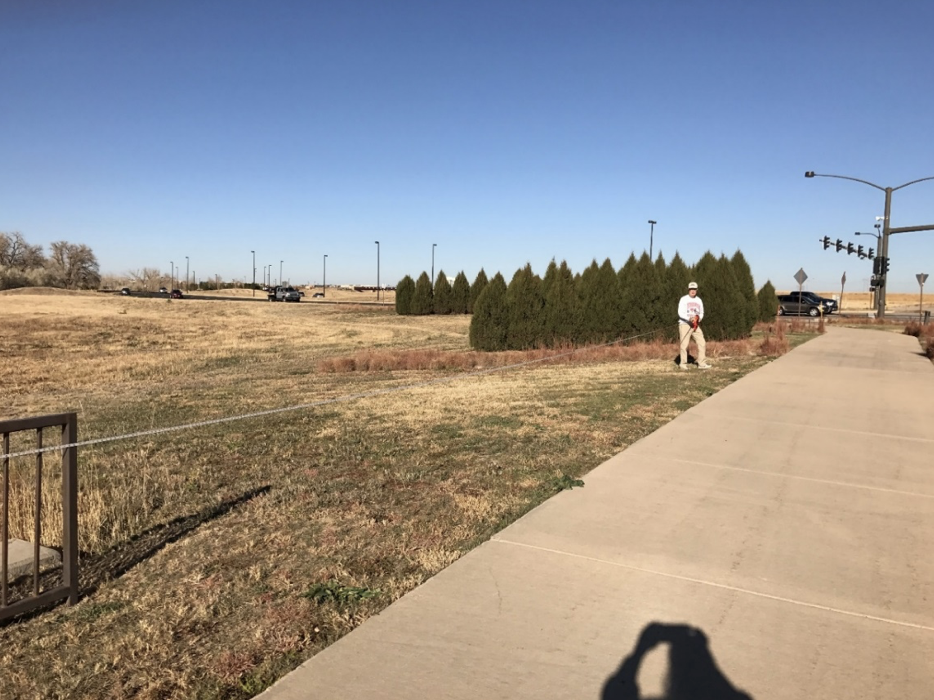
Page 93-95: The officer confirms that Scheller’s car was in the parking lot when he was there. Yet he made no attempt to locate her at the restaurant adjacent the lot, and did not later ask her why she didn’t return his call to her made when he was in the parking lot.
KK: The officer took no action to find Scheller and see if she was impaired
Page 107: The officer is asked how far the “ditch” is away from the intersection. His response: “I don’t know”
KK Because he didn’t measure anything. With all his impressive training, he failed to take note of anything, and took no measurements.
Failure to question a direct witness to the accident ( 7 items )
Karla King was a passenger in the van that was run off the road. She is intelligent, verbally very competent, and at the time held a 1st level brown belt in karate ( able to observe and react in dangerous situations ). Since the accident she has gone to 3rd level brown belt, just below black belt. She was TOTALLY ignored as a witness, but was noticed in a prejudicial comment by the officer during his deposition.
I ( Karl ) served as Jury Foreman in a criminal trial in Wisconsin. I know first-hand how jurors want to see the significant details of the case presented in such a way that the jurors do not have to guess at what happened. An officer’s failure to talk with a direct witness is shocking and incompetent from that perspective.
Page 26/27/28: The officer totally failed to question Karla King who was a witness from inside her mother’s vehicle.
KK:The officer gives a long explanation why he didn’t ask Karla King a single question. This “justification” of not questioning a witness is insupportable. The total failure to question the only witness is dereliction of duty. Had he taken the time to ask questions, he would have learned important details that he never found out on the day of the incident. Earlier, he listed all his training, but we see that when it came time to use that training, he failed to do his job, with negative consequences.
Page 28/29: The officer gives a report of Karla King asking bystanders what they were looking at. He says that Karla’s verbal manner “caught him off guard.”
KK: Presumably, the officer has seen accidents with death, dismemberment and lots of blood. Yet he somehow thinks it worth his time to mention an 11 year old girl speaking to bystanders. Why would he bring this up in a deposition? This calls into question his bias against the Kings. Karla’s words to the bystanders have no bearing on the accident, yet he mentions it in the deposition. Evidently his training on not showing bias was weak or unlearned.
Page 47 and 50: The officer recalls talking only with Mrs. King and Ms. Scheller. He says he couldn’t write a ticket based on one person’s account.
KK: Again, the officer totally failed to interview witness Karla King. Had he done so, he would have found grounds for writing a citation. His failure to do his job had significant negative consequences in this matter. His assumption that he wouldn’t have gotten useful information from a witness is completely wrong and indefensible.
Page 67: The officer doesn’t recall Mrs. King being upset with Scheller telling her to shut up.
KK: Had he talked with Karla King, who was present in the parking lot and heard all the conversation, he might have gotten information on the conversation between Daniela King and Scheller. This is another example of a failure to do his job.
Page 104-106: His bias against a child who can verbalize is clearly evident. “I would have put that in my report had Karla, — had I spoken to Karla—”
KK: He doesn’t know that Karla spoke at 9 months, read books at 3 years and began karate at age 3.5. Again, he totally failed to interview a witness who could have given him useful information. He has no knowledge of what she saw and heard, and her level of verbal skill. He never found out because he failed to ask the witness.
Q. And why didn’t you want to talk to her if she was in the car?
A. “For no particular reason.”
KK: The officer is being paid to do a job but apparently couldn’t be bothered to talk with a witness.
Page 112: The officer is asked if Daniela King asked him to talk with her daughter.
KK Does he have to be asked to do his job? What is he being paid for?
The officer states: “… I mean your assumption can be… “
KK I thought that he said he didn’t make assumptions. See below, Page 75 comments.
“… and the fact that she’s a minor. She was already upset about the events that allegedly occurred.”
KK So he fails to talk with her because she’s a minor, assuming that a minor cannot provide useful or critical information. Are minors not interviewed in child abuse cases, even though the subject matter might be highly emotional for them?
Page 75: The officer states that, “as a law enforcement professional, I don’t speculate. I gotta – you know, I don’t make assumptions.”
KK: The facts show that the officer indulged in speculation and assumptions all through this investigation. His work was seriously lacking in professional practice.
Lack of professional judgement ( 2 items )
Page 82: The officer knows that if vehicle damage is over $1,000 that triggers a report.
KK: The actual vehicle damage was over $2,500. The officer should have expected that undercarriage damage would exceed $1,000.
Page 96-98: Scheller told the officer that she was a doctor who had to get to an appointment.
KK: Scheller, being in the medical field likely knows that medical doctors are given leeway by law enforcement. The officer assumes that she is a medical doctor. Scheller has a PhD in hospital administration, and is not a licensed medical doctor. Scheller pulled a fast one on the officer and he totally fell for it. It never occurred to him that he was being mis-led to impress him and get him to back off on his investigation. It appears that the officer is gullible and easily tricked.
Bias ( 2 items )
Page 23/8: He claims that he was impartial and fair.
KK: Facts set forth in this section show that he failed at both of those.
Page 98/99: The officer states that he presumed Mrs. King was not from the U.S. and claims that it didn’t bias his investigation.
KK: Then why bring up the matter of her not being native-born to the U.S., especially in a deposition to be played in court in front of jury? He states that it didn’t affect his investigation but it appears to have influenced his reporting.
Officer Lorenzen fails to locate Scheller to see if she is impaired, and fails to consider drugs/alcohol. He fails to interview Karla King, a direct witness, but mentions that she spoke sharply to bystanders. He also mentions in the depo that Daniela King spoke in a way that suggests that she is not from the United States.
His actions in favor of the perpetrator Scheller, and against the plaintiffs suggest that he is either biased, or acts in a way that suggests bias. We expected better from an experienced officer on the Loveland force.
Summary of our Complaint
Despite adequate training to handle an accident investigation, the officer failed in many respects of effort, failure to question a key witness, poor professional judgement, and inserting his own biases into his deposition.
Corrective actions
Is this level of competence acceptable for the officer’s rank and pay? Do you consider Officer Lorenzen to be a good example for other Loveland police officers?
The officer’s dereliction had serious consequences in our case – these were not minor or inconsequential lapses. We ask that responsible parties take action to see that training is better applied so that others do not suffer from similar failures, and that the training funds paid for by citizens of Loveland are not wasted on officers who fail to carry out their normal duties.
We would appreciate a response from responsible parties on what they might do for corrective action(s) in this quality matter.
Best regards,
Karl, Daniela and Karla King
1666 Streamside Drive
Fort Collins, Colorado 80525
Enclosure
Summary file of deposition PDF
Standard Letter reply from The Loveland Police Department – No documents related to this investigation were provided to us! This letter shows that the Loveland Police Department admitted no fault whatsoever and gave no indication that any substantive corrective action would be taken. Despite all the failings of the police officer they had no admission and no program for improving things.
